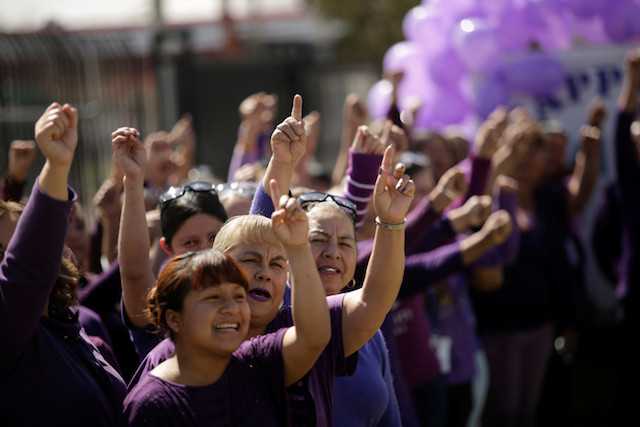A working day without women: Strikes across Latin America follow enormous rallies
10 March, 2020

Latin American women stayed away from offices, academic institutions and authorities offices on Mon to join another day of marches to protest against gender violence, inequality and restricted legal rights.
Monday's wildcat hit, dubbed "a time without us," is supposed showing what life would be like if females vanished from contemporary society. It followed a series of significant protests on Sunday to tag International Women's Day.
In the northern Mexican city of Ciudad Juarez, just across the US border, factories stood unusually quiet as much women stayed home.
"I don't even desire to believe if this went on for a prolonged time frame," said Luis Carrillo, a good supervisor at NPD Technology, a company which makes electronic parts for automated doors in a metropolis famous for its large numbers of assembly plants.
"There would be large losses," he stated, adding that the business is proud to support its overwhelmingly feminine workforce and opinions the protests as great.
Early on Monday afternoon, the company's factory floor presented rows of unoccupied tables and desks.
The task stoppages in Mexico also included indigenous Zapatista women in the south and numerous office employees in the capital. Paola Rojas, a lady columnist for key daily El Universal, remaining her space in the newspaper entirely blank anticipate for a hashtag helping the protest.
In Chile, women wearing medical uniforms, professional overalls and institution uniforms joined a march down a central thoroughfare of Santiago, the administrative centre, to congregate outside President Sebastian Pinera's downtown office.
They banged drums, danced and chanted: "And how, how, how the hell can they torture and rape us and nobody does anything?"
Included in this was Rosa Ramirez-Rios, an actress in her 70s. Half a year ago, she said, a lot of women in the audience wouldn't normally have dared to participate.
"I know it's an extended process," she said. "We should have persistence, persistence, a whole lot of courage and a lot of desire. The economic and political powers won't give up their privileges easily."
The Mexican capital's usually traffic-choked streets were almost empty at rush hour on Mon. Public transport was typically devoid of women, academic institutions were closed and many workplaces were empty.
Molotov cocktails were thrown at the doors of the national palace and women of all ages clashed outside its primary cathedral with male anti-abortion protesters, some with shaved heads and making Nazi salutes.
President Andres Manuel Lopez Obrador had said government employees were absolve to join the walkout.
According to a poll published late the other day by simply newspaper El Financiero, 67% of Mexicans surveyed explained they supported the stoppage, even while 57% of women said they planned to become listed on.
Some Mexican women chose to turn up for his or her jobs, saying work was its kind of protest, with others saying they cannot afford to miss a day.
Cristina Velez, director at Montessori's World, an exclusive institution, said she had given teachers the day off and kept the institution open by making use of administrative staff.
Protests there are focused on a surge found in femicides, or perhaps gender-motivated killings of girls. These jumped 137% during the past five years, government figures express, as gang violence pushed the countrywide murder tally to record heights. Most violent crimes in Mexico proceed unsolved.
"We don't want extra violence. They have to punish those that commit crimes," Velez explained.
Organizers of Sunday's march found in Santiago estimated two million persons took part, weighed against a police estimate of 150,000, and there were sporadic clashes between marchers and law enforcement.
Source: www.thejakartapost.com
TAG(s):
